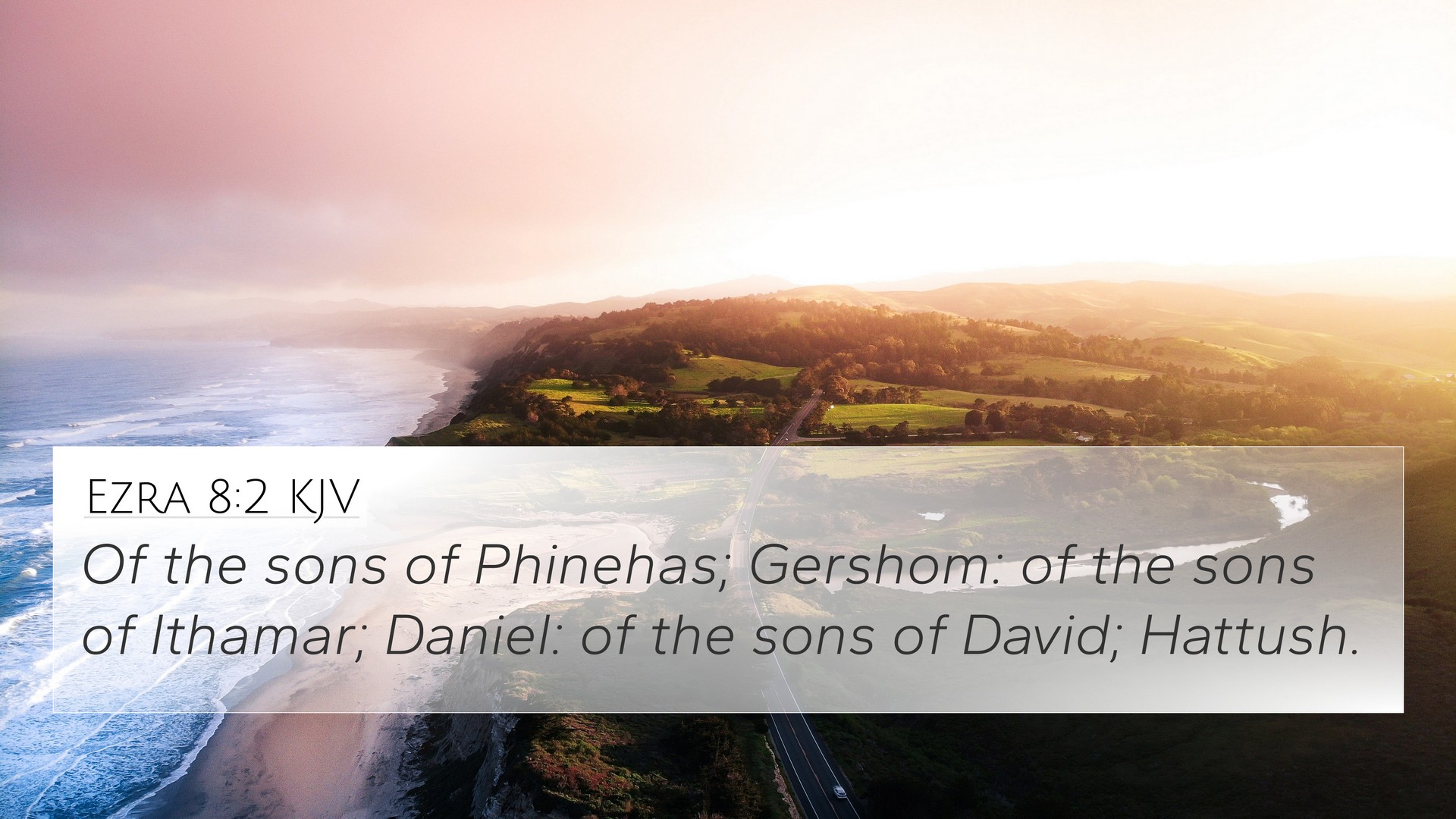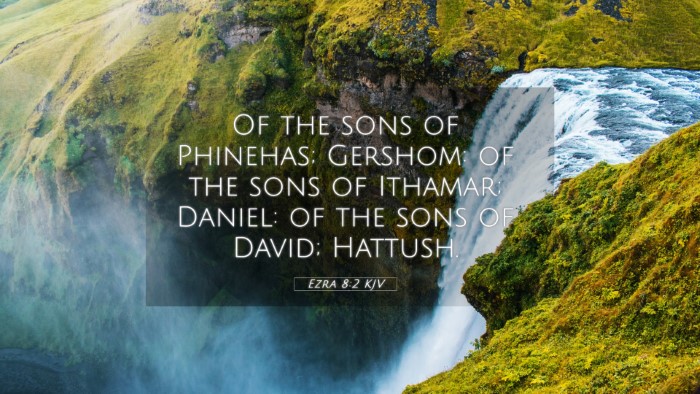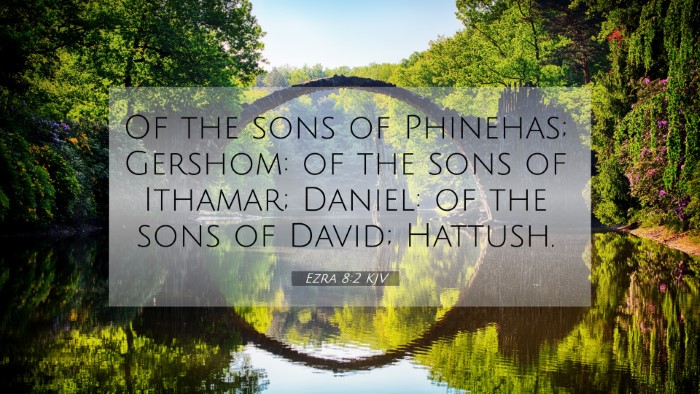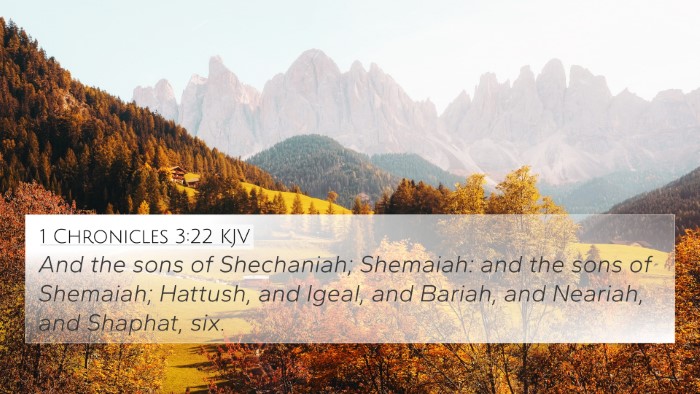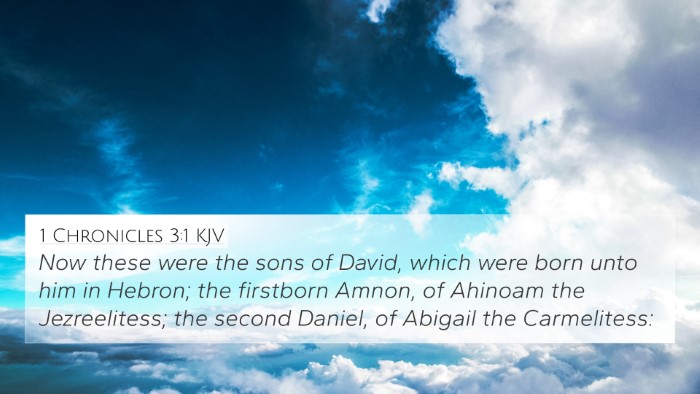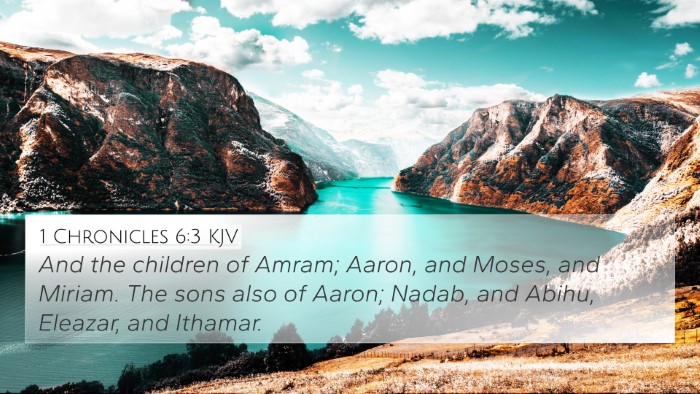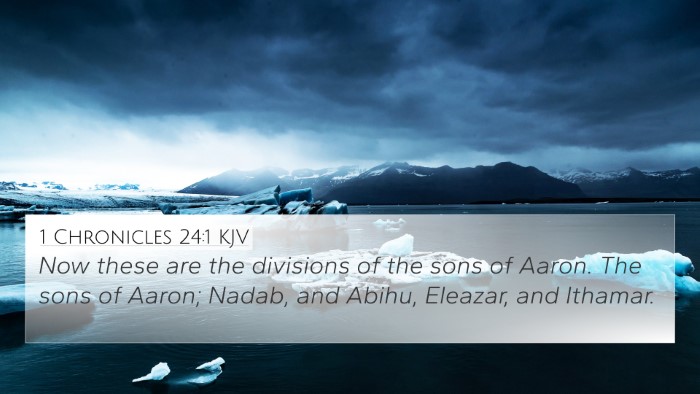Understanding Ezra 8:2
Ezra 8:2 reads: "Of the sons of Phinehas; Gershom: of the sons of Ithamar; Daniel: of the sons of David; Hattush." This verse provides a critical element in the narrative of the returning exiles from Babylonian captivity, showing the lineage and the appointed leaders who would partake in the temple restoration and the spiritual revival in Jerusalem.
Verse Meaning and Context
This verse is part of a larger passage that details the preparation for Ezra's journey back to Jerusalem. It highlights the importance of lineage and priestly heritage in the mission of restoring worship practices and instilling a sense of reverence for God among the returning Israelites. The specific mention of notable figures, such as the sons of Phinehas, Ithamar, and David, emphasizes the continuity of the priestly office and the returning of a once-dominant lineage to play a vital role in the reconstruction of the community.
Insights from Public Domain Commentaries
- Matthew Henry: In his commentary, Henry synthesizes the importance of priestly ancestry, stating, "God's people have been preserved and maintained in the world by a continual succession of individuals who are called and equipped by Him." He highlights the significance of these genealogical records in maintaining spiritual order and integrity during the restoration period.
- Albert Barnes: Barnes explains how the naming of these leaders was not merely for historical sake but rather illustrates God's providence in appointing capable individuals for His service. He notes, "The listing demonstrates God's selection of faithful individuals, ensuring the spiritual leadership aligns with the historical needs of the community."
- Adam Clarke: Clarke focuses on the role of these leaders in the grand narrative of restoration. He posits that "Their leading names reflect God’s covenant-keeping commitment to His people, affirming His plans for returning them back to Him through their history and heritage."
Cross-References and Thematic Connections
This verse can be connected to several other passages throughout the Bible that emphasize the importance of lineage, leadership, and the dynamics of community restoration:
- Exodus 28:1: The consecration of Aaron and his sons to serve as priests, emphasizing the priestly lineage.
- 1 Chronicles 6:4-15: Details the descendants of Aaron, illustrating the importance of lineage in priestly duties.
- Nehemiah 12:1-26: Provides a list of priests and Levites who returned with Ezra, emphasizing the continuity of priestly offices.
- Matthew 1:12-17: A genealogy that illustrates the lineage of Jesus, linking significant characters from Ezra’s time to the Messianic fulfillment.
- Hebrews 7:14: Establishes Jesus’ lineage as a priest from the tribe of Judah rather than Levi, showing a shift in priestly roles.
- Psalm 78:68-71: Reflects on God's choice of David and the continuation of Davidic leadership which is crucial for God's people.
- Jeremiah 33:17-22: Offers a promise of restoration to David’s descendants, speaking to continued priestly and kingly authority.
Bible Cross-Reference Analysis and Application
The significance of Ezra 8:2 lies not only in its immediate context but also in its broader implications related to the themes of restoration, leadership, and divine calling. By linking this passage with others, we gain insight into God’s overarching narrative regarding His people:
- Thematic Connections: This verse ties into themes of restoration seen throughout both the Old and New Testaments. The role of Ezra and the individuals mentioned represents God’s commitment to restoring worship and community integrity.
- Cross-Referencing Biblical Texts: The genealogy and leadership roles in Ezra parallel similar instances in both the Gospels and the Pentateuch, illustrating God's consistent approach towards leadership and community governance.
- Inter-Biblical Dialogue: This verse serves as a bridge to conversations about God’s fidelity in challenging times for His people, showing how leadership persists through troubled waters.
Tools for Effective Bible Cross-Referencing
To deepen your understanding and exploration of cross-referenced Bible verses, utilizing effective tools can significantly enhance your Bible study:
- Bible Concordance: Helps locate verses by keywords and themes.
- Bible Cross-Reference Guide: Offers a structured way to discover related verses.
- Cross-Referencing Bible Study Methods: Incorporates various strategies for thematic exploration.
- Bible Reference Resources: Can provide additional commentaries and historical context.
- Bible Chain References: Connects verses in a sequence that relates thematically for easier study.
Conclusion
In summary, Ezra 8:2 is a foundational verse that serves as more than just a historical record; it is a profound statement on the continuity of God’s faithfulness through leadership and ancestry. By utilizing comparative studies and thematic connections within the scriptures, one can better appreciate the richness of God’s story and the relevance this passage holds for believers today.
